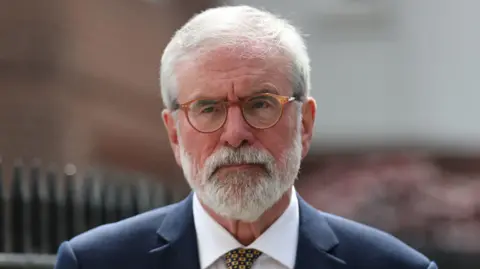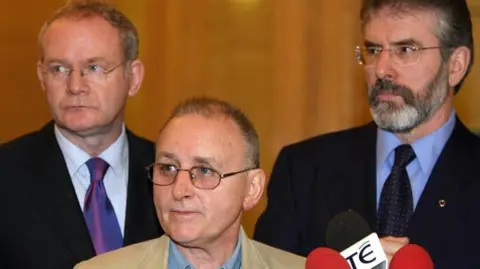Five questions the Gerry Adams libel case jury must answer to find a verdict
 PA Media
PA MediaAfter four weeks of evidence in Dublin, the jury in Gerry Adams' libel case against the BBC is expected to be sent out to consider its findings soon.
He is suing over a 2016 Spotlight programme and online report in which an anonymous source alleged the former Sinn Féin leader sanctioned the murder of a British agent, Denis Donaldson.
Mr Adams, 76, denies the claim.
It will be for the 12-member jury to decide whether Mr Adams has been defamed. And, to assist, they have been given an "issue paper" consisting of five questions, which will determine whether he is entitled to damages and, if so, how much.
On Tuesday, the judge continued to recap the evidence in the case for jurors.
The high-profile trial at Dublin High Court has entered its fifth week.
Mr Justice Alexander Owens will carry on with his summary of the evidence on Wednesday.
Once he has finished, the jury will retire to consider its findings.
How much could the damages be?
The damages could be anything from zero to more than €300,000 (£250,000), as per existing guidelines.
At the opening of the case against the BBC at the High Court in Dublin, the former Sinn Féin leader said he would give any award to "good causes".
But it is the jury in the case who are the "fact-finders" - not Mr Justice Alexander Owens, the judge who is supervising things.
What questions must the Gerry Adams libel jury answer?
Mr Adams has alleged he was defamed in two separate pieces of BBC output in September 2016 – a Spotlight programme and an accompanying online story.
The first question the jury will answer is whether the words in the programme "mean Mr Adams sanctioned and approved Denis Donaldson's murder".
The second question is the same, save for relating to the website story.
The BBC has argued the words were couched as allegations – Mr Adams' side has claimed allegations were presented as fact.
It is for the jury to decide what the words mean to "a reasonable member of society".
Should nine or more jurors determine the words mean what Mr Adams claims they do, the jury then moves on to address further questions.
These relate to whether they believe the BBC has shown it acted in "good faith" and was "fair and reasonable" in its story.
The BBC has mounted this defence, which is set out in section 26 of Ireland's 2009 Defamation Act.
If the jury rejects the BBC defence, they will go on to question five – how much in damages should be awarded to Mr Adams.
Mr Justice Alexander Owens has told the jury this is where Mr Adams' reputation becomes a consideration.
The judge said the BBC's position is simple – "send him packing" with a euro, or even a cent, because his reputation, related to the IRA and the Troubles, is "bad".
Mr Adams, at this trial and for decades, has denied ever being an IRA member.
Mr Adams' lawyers presented his reputation differently.
They believe he would be due "very substantial" damages of at least €200,000 (£168,000), reflecting his role in bringing about peace in Northern Ireland.
To recap; damages will only be considered if the jury finds the words mean what Mr Adams has pleaded, and if they reject the BBC's section 26 defence.
Who was Denis Donaldson?
 PA Media
PA MediaMr Donaldson was once a key figure in Sinn Féin's rise as a political force in Northern Ireland.
But he was found murdered in 2006 after it emerged he had worked for the police and MI5 inside Sinn Féin for 20 years.
In 2009, the Real IRA said it had murdered him.
Based on sources, Spotlight claimed the killing was the work of the Provisional IRA.
Mr Donaldson was interned without trial for periods in the 1970s and, after signing the Good Friday Agreement, Sinn Féin appointed him as its key administrator in the party's Stormont offices.
In 2005, Mr Donaldson confessed he was a spy for British intelligence for two decades, before disappearing from Belfast.
He was found dead in a small, rundown cottage in Glenties, County Donegal.
Who is Gerry Adams?
Mr Adams was the president of republican party Sinn Féin from 1983 until 2018.
He served as MP in his native Belfast West from 1983 to 1992 and again from 1997 until 2011 before sitting as a TD (Teachta Dála) in the Dáil (Irish parliament) between 2011 and 2020.
Mr Adams led the Sinn Féin delegation during peace talks that eventually brought an end to the Troubles after the signing of the Good Friday Agreement in 1998.
He was detained in the early 1970s when the government in Northern Ireland introduced internment without trial for those suspected of paramilitary involvement.
Mr Adams has consistently denied being a member of the IRA.
